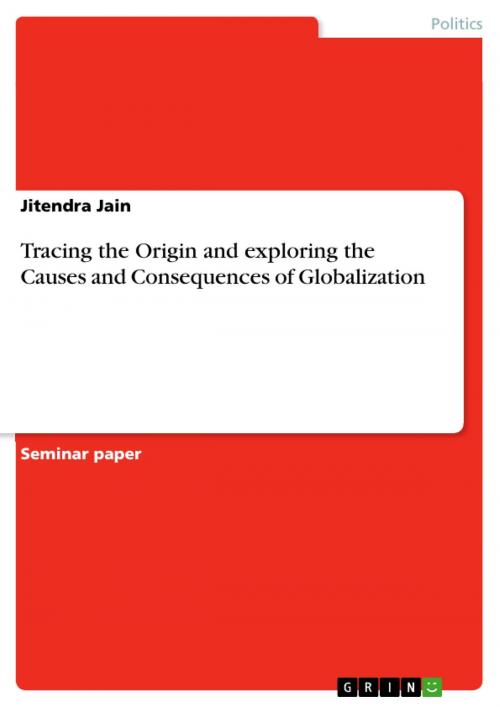Tracing the Origin and exploring the Causes and Consequences of Globalization
Nonfiction, Social & Cultural Studies, Political Science| Author: | Jitendra Jain | ISBN: | 9783640793273 |
| Publisher: | GRIN Publishing | Publication: | January 5, 2011 |
| Imprint: | GRIN Publishing | Language: | English |
| Author: | Jitendra Jain |
| ISBN: | 9783640793273 |
| Publisher: | GRIN Publishing |
| Publication: | January 5, 2011 |
| Imprint: | GRIN Publishing |
| Language: | English |
Seminar paper from the year 2007 in the subject Politics - International Politics - Topic: Globalization, Political Economics, grade: 2.0, Ruhr-University of Bochum (European Culture & Economy), course: MA (ECUE), language: English, abstract: The term globalization first appeared in 1962 as jargon. Perhaps this is one of the most controversial terms in recent history. The Economist has called it 'the most abused word of the 21st century'. Globalization means different things to different people. Anthony Giddens rightly says 'As an unpredictable and turbulent process, globalization is seen and understood very differently by observers.' Globalization gurus are puzzled about the direction and consequences of globalization. Some appreciate it and believe that it would lead to universal peace and harmony- nirvana. Others condemn it, as they believe that it would lead to all kind of chaos and Unordnung. Unfortunately it is also true. Globalization has also contributed to recent terrorism. In this work I make an impartial attempt to present an objective understanding of the term 'Globalization'. Globalization is causing many structural changes and I admit that some of them are very cruel. Can globalization be stopped ? If, not then what strategy should be adopted to protect the masses. This work aims to find answers to several such questions. I begin with conceptualization of the term globalization. Then I briefly describes implications of globalization in various fields. Later part mainly deals with economic, political and communication dimensions of globalization. Attempts are made to trace the origin of globalization. Several debatable and contradictory arguments are put also forward. Assuming globalization as dependent variable, I proceed to elaborate on various factors, which causes globalization. Internet, bandwidth and flow of information without any hindrance have contributed to contemporary globalization. Such free flow of information has also occasionally led to divisions among humanity.Al Jazeera's live broadcast of conflicts has created hindrance between Arabs and Israelis. Globalization is creating significant impact on welfare system in developed countries. Therefore, taking globalization as an independent variable I deal with it's consequences in the forthcoming part. The discussion about globalization would be incomplete without mentioning contribution of America and also how globalization has led to terrorism. Globalization is reality and it comes with both advantages and disadvantages. Measures should be initiated to control negative impacts of globalization and positive aspects should be encouraged. Concluding chapter deal with certain surviving strategies.
Seminar paper from the year 2007 in the subject Politics - International Politics - Topic: Globalization, Political Economics, grade: 2.0, Ruhr-University of Bochum (European Culture & Economy), course: MA (ECUE), language: English, abstract: The term globalization first appeared in 1962 as jargon. Perhaps this is one of the most controversial terms in recent history. The Economist has called it 'the most abused word of the 21st century'. Globalization means different things to different people. Anthony Giddens rightly says 'As an unpredictable and turbulent process, globalization is seen and understood very differently by observers.' Globalization gurus are puzzled about the direction and consequences of globalization. Some appreciate it and believe that it would lead to universal peace and harmony- nirvana. Others condemn it, as they believe that it would lead to all kind of chaos and Unordnung. Unfortunately it is also true. Globalization has also contributed to recent terrorism. In this work I make an impartial attempt to present an objective understanding of the term 'Globalization'. Globalization is causing many structural changes and I admit that some of them are very cruel. Can globalization be stopped ? If, not then what strategy should be adopted to protect the masses. This work aims to find answers to several such questions. I begin with conceptualization of the term globalization. Then I briefly describes implications of globalization in various fields. Later part mainly deals with economic, political and communication dimensions of globalization. Attempts are made to trace the origin of globalization. Several debatable and contradictory arguments are put also forward. Assuming globalization as dependent variable, I proceed to elaborate on various factors, which causes globalization. Internet, bandwidth and flow of information without any hindrance have contributed to contemporary globalization. Such free flow of information has also occasionally led to divisions among humanity.Al Jazeera's live broadcast of conflicts has created hindrance between Arabs and Israelis. Globalization is creating significant impact on welfare system in developed countries. Therefore, taking globalization as an independent variable I deal with it's consequences in the forthcoming part. The discussion about globalization would be incomplete without mentioning contribution of America and also how globalization has led to terrorism. Globalization is reality and it comes with both advantages and disadvantages. Measures should be initiated to control negative impacts of globalization and positive aspects should be encouraged. Concluding chapter deal with certain surviving strategies.















